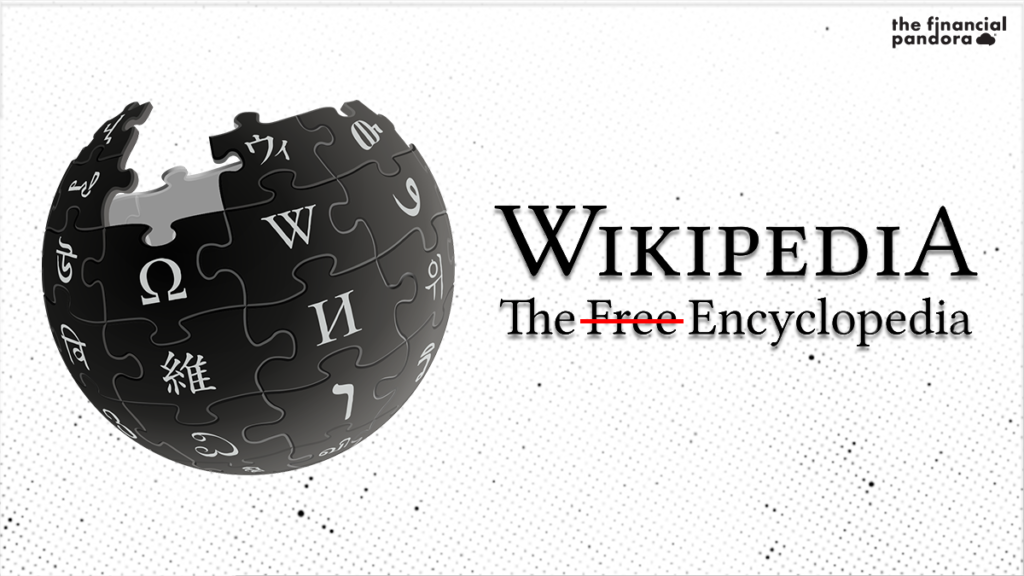Wikipedia, launched in 2001, is the biggest multi-lingual internet encyclopedia. Wikipedia is the largest and most-read reference work in history. It was the 13th most popular website in 2020. Wikipedia has not monetized its content nor does it run advertisements on its websites.
According to its annual report, Wikipedia earned a total revenue of $129 million in 2019-20 but none of it came from advertisements, affiliates, or any paid service. Then what resulted in the whopping $129 million revenue?
How is Wikipedia funded?
Wikipedia is hosted by the non-profit Wikimedia Foundation, and operates on a donation-based revenue model where the organisation gets most of its funds in the form of donations from millions of individuals and corporations around the world. Besides monetary donations, the other sources of revenue for the organisation includes – in kind services and Wikipedia store. According to the Wikipedia Fund Raising Statistics page, Wiki was able to raise $16 million between 2019-2020, bringing its total assets to $180million.

These funds are utilized for various purposes like server costs, ongoing engineering improvements costs, product development costs, design, and research costs, and legal support costs, training, tools, events, and partnership of volunteers, the salaries of around 450 staff members across the world and numerous fundraising programs.
Why the sudden need to monetize its content?
One of the primary reasons is long-term sustainability. For the past 20 years has been funding its growth only through a voluntary donation from readers and corporations. Although Wikimedia holds millions of dollars in reserves, its high reliance on donors questions its non-commercial sustainable model. (Everyone remembers Wikipedia ‘humbly’ asking its Indian users for a small donation last year.)
Self-Funding and Diversification of Revenue
Although Wikipedia has been sustaining on the donation non-commercial model for the past 20 years, the Wikimedia Enterprise acknowledges the organization needs to be self-funding and reduce its dependence on donations from corporations. “We’re going to need more resources, more partners, and more allies if we are going to achieve the goals implicit in our vision statement.” To explore new opportunities for free knowledge dissemination and software development, the organizations need to explore fees or sustainability models of revenue generations.
Pay for Access?
One way to monetize its content would be to charge users fees for accessing their library of information. However, that goes against the very mission that Wikipedia is trying to accomplish –
“to create and distribute a free encyclopedia of the highest possible quality to every single person on the planet in their own language.”
So, charging the public for access is a No-Go Area.
Why does Wikipedia want to charge Big Tech?
When you ask Amazon’s Alexa, “What is Wikipedia?” it’ll tell you this: “Wikipedia is a multilingual, web-based, free encyclopedia based on a model of openly editable content.” Alexa took this line directly from Wikipedia’s entry on Wikipedia, as it does with many of its answers.
Similarly, Apple’s Siri follows the same protocols of scrapping information from Wikipedia. Google also relies heavily on Wikipedia, using it as a source for the Knowledge Graph info boxes it provides along with search results. Google recently began outsourcing fact-checking on conspiracy-related videos to Wikipedia by including on-screen boxes with information scraped from its pages.
Wikipedia’s content is often repurposed by for-profit organizations that rely on it to support their business models, and which consequently earn revenue from it. While Amazon customers pay at least $39.99 for an Echo device, Alexa freely pulls this information from the internet, leeching off the hard work performed by Wikipedia’s devoted volunteers. Big corporations have been freeloading on Wikipedia’s vast knowledge data base without any direct compensation for reuse.
Nevertheless, Big Tech companies do support Wikipedia’s parent foundation in the way of donations. In 2019, Amazon, acknowledging how its Alexa voice assistants rely heavily on information from Wikipedia, donated $1 million to the Wikimedia Endowment. Google.org also a $2 million contribution to the Wikimedia Endowment along with additional $1.1 million donation to the Wikimedia Foundation. Outside of voluntary corporate donations to the Wikimedia Foundation, the movement has never received benefits from any of this revenue through return investment.
But are the corporation donations sufficient? Apparently Not.
According to Katherine Maher, the Chief Executive Officer of the Wikimedia Foundation, Wikipedia itself doesn’t monetize its content, profiteering companies do so without commensurate or in-kind support that is critical to its sustainability.
So, the next inevitable step for becoming self-funding – charge the Big Tech Companies.
How exactly does Wikipedia plan on monetizing its content?
Big Tech Companies do not directly use Wikipedia’s content for their purpose. Each of these large companies independently re-builds Wikimedia projects internally to address their very similar use-cases. For this purpose, they have low-level teams for filtering, modifying and re-building the information. This significant investment is not only duplicated effort, but also represents resources spent within each company rather than in support of Wikimedia itself, or the broader free knowledge ecosystem.
The Wikimedia Enterprise API is a new service focused on use cases of high-volume for-profit re-users of Wikimedia projects, that those entities can use at scale, and for which they will be charged. Wikimedia will package existing publicly-available data from its projects and make commercial companies reuse them on their services.
Wikimedia Enterprise’s focus is on businesses that reuse our content, typically at a large scale —integrated into knowledge graphs, search, voice assistants, maps, news reporting, community tools, third-party applications, and full-corpus research studies.

Wikimedia Enterprise API’s users would be provided this service under a commercial contract known as a Service Level Agreement (SLA) and would cater mainly to four immediate needs from a service that supports large-scale content reuse: system reliability, high-frequency or real-time access, content integrity, and machine readability.
The Wikimedia Enterprise is still in its nascent therefore the specific business model and the most appropriate pricing levels are still being investigated.
All in all, Wikimedia Enterprise is an attempt to balance commercial endeavours while upholding the benevolent mission of free access to knowledge. Wikipedia is an extraordinary resource, a cumulative effort over two decades to describe the world. Monetizing its services to the rapacious for-profit companies will be provide Wikipedia the due credit and recognition it deserves along its better dissemination of information.
For source click here
This post was written in collaboration with Asif Yahiya Sukri LLP. Asif Yahiya Sukri LLP provides unparalleled personalized financial services to a broad range of clients across different geographical locations. With a presence in the USA, India and the MENA region, they ensure that all of your financial decisions are made carefully and with your best interests in mind. They are innovators who understand what goes into building companies.
You can also reach out to them on info@aysasia.com
Follow Us @




